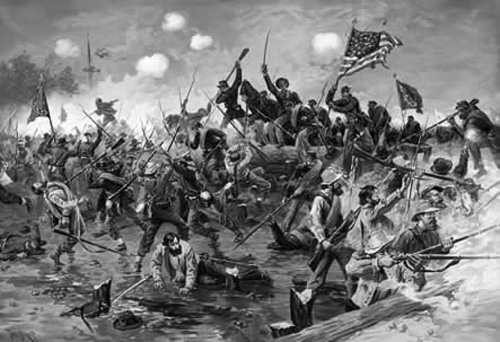American Revolutionary War, the American War of Independence, or simply the Revolutionary War in the United States, was the rebellion of thirteen of the North American colonies of Great Britain who declared themselves independent in 1776 as the United States of America.
France signed an alliance with the new nation in 1778, which escalated the conflict into a world war between Britain and France, Spain, and the Netherlands. In July 1776, after their last petition for redress to King George was ignored, the Continental Congress declared independence.
The British were meanwhile mustering forces to suppress the revolt. A large fleet brought Sir William Howe to New York, where he outmaneuvered and defeated Washington at the Battle of Long Island, and captured New York City and New Jersey.
Washington then took advantage of Howe’s carelessness to capture a Hessian detachment at Trenton and recapture New Jersey for the Patriots. In 1777 Howe’s army launched a campaign against the rebel capital at Philadelphia instead of aiding Burgoyne’s separate invasion force coming down from Canada.
After 1778 the British shifted their attention to the southern colonies, which brought them initial success when they recaptured Georgia and South Carolina for the Crown in 1779 and 1780. In 1781 British forces attempted to subjugate Virginia, but a French naval victory just outside Chesapeake Bay led to a Franco-American siege at Yorktown and the capture of over 7,000 British soldiers.
The defeat at Yorktown, as well as increasing Franco-Spanish threats in the Caribbean and Mediterranean, finally turned opinion in the British Parliament against the war. A vote in February 1782 to end hostilities passed by a narrow majority of just 19 votes limited fighting continued throughout 1782, while peace negotiations began.

In 1290, the Guardians of Scotland signed the Treaty of Birgham agreeing to the marriage of the Maid of Norway and Edward of Caernarvon, the son of Edward I, who was Margaret’s great-uncle.
This marriage would not create a union between Scotland and England because the Scots insisted that the Treaty declare that Scotland was separate and divided from England and that its rights, laws, liberties and customs were wholly and inviolably preserved for all time.
On 11 June, acting as the Lord Paramount of Scotland, Edward I ordered that every Scottish royal castle be placed temporarily under his control and every Scottish official resign his office and be re-appointed by him.
Two days later, in Upsettlington, the Guardians of the Realm and the leading Scottish nobles gathered to swear allegiance to King Edward I as Lord Paramount. All Scots were also required to pay homage to Edward I, either in person or at one of the designated centres by 27 July 1291.
In 1763 it was decided to draw a border behind the existing colonies, along the line of the Alleghenies. The land to the west was to be left to the Indians, who were to be encouraged to become consumers of British goods.
New colonists were to be encouraged to go north to Nova Scotia, where they could produce much needed timber for the navy, or south to Florida. This limit on their expansion caused much discontent amongst the colonies, costing many, including George Washington, a good deal of money.